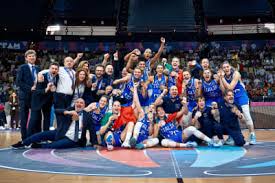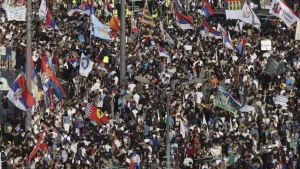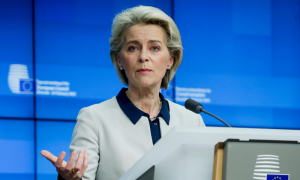Hamza Shehbaz arrested in money laundering case

Lahore: The National Accountability Court (NAB) Lahore on Tuesday arrested the Leader of the Opposition
in the Punjab Assembly and Pakistan Muslim League-Nawaz (PML-N) leader Hamza Shehbaz in Ramzan
Sugar Mills, and money laundering and assets beyond means cases as the Lahore High Court (LHC) turned
down his applications for extension in his interim bail.
Subsequently, the development has allowed the NAB to further investigate into corruption charges against
him, and in this regard, a special team has shifted him to the bureau’s headquarter at Thokar Niaz Baig in
Lahore.
Meanwhile, scores of PML-N supporters gathered at the Mall Road, expressed anger and chanted full throat
slogans against the government.
A two-member bench headed by Justice Muzahir Ali Akbar Naqvi resumed the hearing. Strict security
arrangements were made in and outside the high court before the arrival of Hamza Shehbaz and PML-N
political workers were kept away from entering towards the roads leading to the courthouse.
As the hearing resumed, Salman Butt, the defense counsel for Hamza, argued that according to the NAB
ordinance, the bureau could not issue arrest warrants unless an inquiry over the matter is completed.
He further stated that in this case, the investigation into money laundering case was still ongoing and his
client was coordinating with the investigation team.
To which, Justice Naqvi remarked that the judgment will be done according to the constitution, and justice
will be ensured.
Contrarily, the NAB prosecutor stated that Hamza’s arrest warrants were issued according to the law as the
Financial Monitoring Unit had found his involvement in the money laundering.
Moreover, the prosecutor submitted complete details of assets of Shehbaz Sharif’s family members in the court
with an argument that their assets are beyond their known sources of income.
Regarding money laundering accusations, the prosecutor said not only Hamza, but Shehbaz Sharif, Nusrat
Shehbaz and Salman Shehbaz were also involved in the crime.
“Billions of rupees were added to the assets of Shehbaz’s family, whereas Hamza couldn’t provide details of
the sources of his income,” he added.
The bench was further told by the NAB that in the year 2018, his assets were found to be worth Rs410 million,
whereas he could not prove assets worth Rs380 million, and the money was laundered to Dubai and England,
and 40 individuals were involved in the money laundering.
The court was also informed that the bureau had already arrested two money exchangers, and that [out of the
total 40] 38 individuals have not confessed [their crime] despite of the fact that the amounts were transferred
from their accounts.
“Rs180 million were laundered, and Hamza was unable to provide sources of the amount,” the prosecutor
concluded.
On the other hand, the NAB had constituted special teams for the arrest of Hamza. Three teams of the
accountability watchdog were present outside the court.
Police have ensured strict security arrangements outside the judicial complex and have blocked adjoining
roads for routine traffic. The litigant public will be denied entry to the complex.
The NAB has been investigating into the PML-N leader’s alleged involvement in the money laundering case,
and according to sources, he stands little chance of getting his bails extended in the cases.
All evidences found against Hamza have been included in a file as the NAB prosecutor will present his
arguments for convincing the court that his arrest is critical for further investigation into in the case(s).
In the previous hearing, the court had strictly directed defense counsel to present the arguments in the next
hearing (today), so the bench could announce the judgment.
In the hearing, the prosecutor had argued that Hamza’s assets swelled by millions of rupees while he failed to
provide details of sources of his income, and that a reference against him regarding the Saaf Pani Company
case has already been filed in the accountability court.
Contrarily, the PML-N leader’s defense counsel had responded with the argument that the NAB had nominated
his client after filing the reference.
Regarding the accusations against Hamza in Ramzan Sugar Mills case, the defense had further stated that a
drainage system – a 10-km nullah for draining of water from the mill, by misusing the authority and
misappropriating Rs21 million of public funds for their benefit, for which they pleaded not guilty – was built
following an application of local MPA.
Subsequently, he had sought 10 days time from the court by arguing that advocate Salman Butt was abroad,
and he needed time to appear before the bench.
To which, Justice Naqvi had remarked that already two months have passed and, “[usually] that much time is
not granted in pre-arrest bails, here [in the court] applications for interim bails are pending for the last four
years.”
Earlier on May 28, a two-member bench forwarded the bail matter to the chief justice for its fixation before
any other appropriate bench when Hamza requested asked the bench to refer the matter to any other bench to
protect integrity of the court following certain reservations on it in the light of a ‘controversial’ media
interview of NAB Chairman retired Justice Javed Iqbal.
On May 28, the court extended Hamza’s pre-arrest bail for an unspecified period of time.
On May 22, the court had extended Hamza’s pre-arrest bail till May 28 in the same cases.
On May 8, the court extended his bail till May 22 when his counsel pointed out that the National
Accountability Bureau (NAB) had not given them reasons for his arrest and the documents showing approval
of the inquiries by the competent authority.
All the accused persons, including PML-N president and opposition leader Shehbaz Sharif, and his two sons
Hamza Shehbaz and Salman Shehbaz, have already been indicted in the Ramzan Sugar Mills case. They have
been indicted for building a drainage system, a 10-km nullah for draining of water from the mill, by misusing
the authority and misappropriating Rs21 million of public funds for their benefit, for which they pleaded not
guilty.





